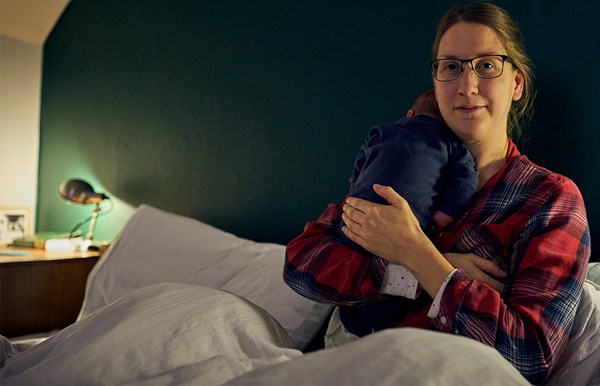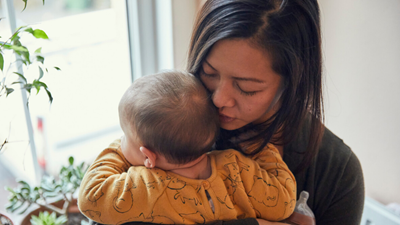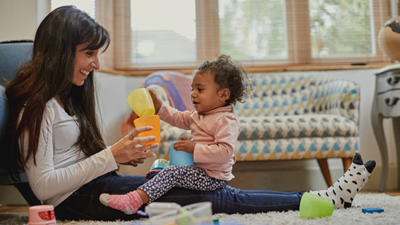Up to 1 in 5 mums and 1 in 10 dads experience perinatal mental health problems.1
In some places new parents get the help they need, in others – because of a lack of services, funding, training or staff - they can’t.
At this difficult time, it’s crucial no parent or baby is left behind and the services they need are there to support them – wherever they live.
We called on governments across the UK to help parents by ensuring support is in place at every stage.
There are stories from around the UK
"I never knew if there was mental health support available for me as a dad back then [...] but I know I could have used more support. There needs to be resourcing and funds made available so this kind of support can be provided."
Callum, a dad in Northern Ireland
"I had no idea that you could experience scary thoughts about the baby and that it was called postnatal anxiety - I thought I was genuinely losing my mind."
Mum in Wales
"When my little boy was about two weeks old the visions started. […] When he was about 6 months old, I remember sitting on my bed with my back to him and I turned around and he was ‘possessed’ and staring at me. Really it was just my beautiful little boy looking at his mummy."
Janine, a mum in England
"I do feel that there is more out there to help women and families with what I went through but mental health is lacking in funding and understanding"
Mum in Wales
"During and after my first two pregnancies my mental health suffered desperately. All my health visitors were lovely but by necessity they had to rush."
Natalie, a mum in England
"I’d like to see professionals checking in on dads’ mental health and inclusion for dads at the start of their parenting journey and beyond."
Cahir, a dad in Northern Ireland
"I want people to know that these feelings don't last forever. That black cloud that created a storm in my life soon passed and perhaps could have passed even sooner if I had gotten the help I needed."
Tayah, a mum in England
"…. I believe that my ability to bond with my child has been affected & I fear this may have consequences later on."
Mum in Wales
"I left the hospital feeling such shame, embarrassment and worry. My fears of my baby being taken away turned into believing that my baby was going to die. […] I had to fight so hard to get anyone to listen to me."
Mum in Northern Ireland
"I was breaking down and I knew I needed help to cope but I was horrified to discover the mental health services I needed weren’t available in Northern Ireland."
Mum in Northern Ireland
"I had to fight to be listened to. I knew I had depression. They kept telling me it was baby blues but I knew it wasn’t. I felt fobbed off by my doctors when I went to them for help."
Mum in Wales
"I didn’t know what it was at the time, I just knew I couldn’t make myself move. I wanted to brush my teeth and do my hair, but I couldn’t. On the odd day, I’d manage but that was so rare. It was awful, like a dark cloud all around me."
Tayah, a mum in England
"All parents should have access to good perinatal mental health support."
Jen Baker, Specialist Health Visitor in England
"The majority of visits from care workers that followed our son’s birth were about checks on the baby. When these were done they’d say ‘Ok, see you in 4-6 weeks’ and off they’d go. If you’re never asked about your mental health as a parent, you don’t feel like you have the option to speak up and get help."
Gary, a dad in Northern Ireland
"Maybe if I’d had more visits, my Health Visitor could have picked up on how I was feeling. Likewise, maybe if I’d been pressed more I would have spoken out and how I was doing would have been noticed. The opportunity passed too quickly. "
Natalie, a mum in England
"Parents and children deserve the right support from appropriately trained health professionals who understand impact of illness on family; with appropriate support, impact of illness can be greatly reduced."
Mary Duggan, Specialist Health Visitor in Northern Ireland
"When I was going through this, I just felt completely worthless to my family and I felt like something was pulling me, a physical pull, to disappear into something dark."
Janine, a mum in England
"Timely and the right support is vital in helping mothers to enjoy their babies and laying the best possible foundations for not only their mental health, but especially that of their children."
Alice Gibson, Special Perinatal Health Visitor in England
"It helps to know why something like this is happening to you and that it will end. You shouldn’t feel ashamed."
Natalie, a mum in England
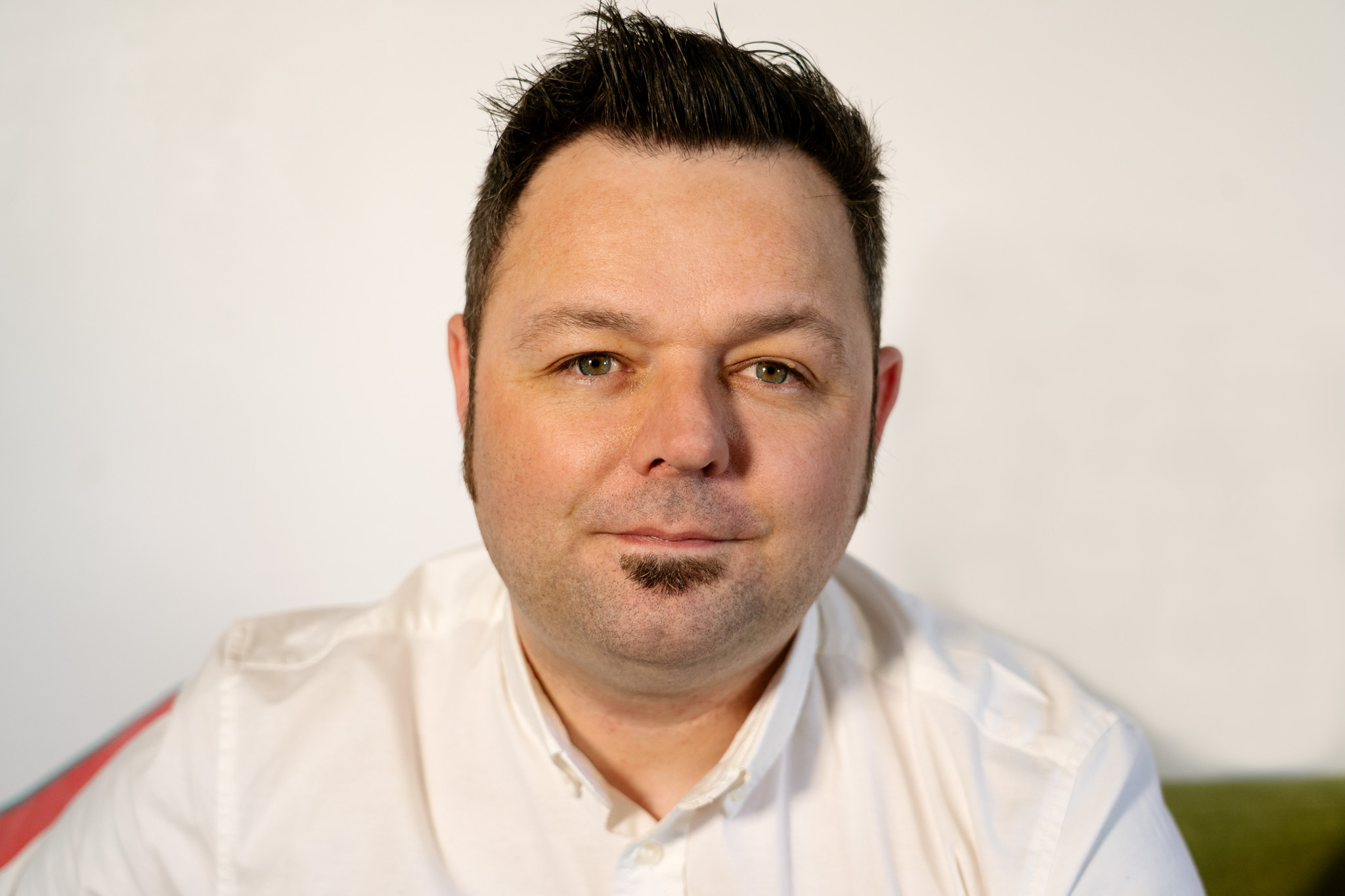
Every new parent who needs it deserves mental health support
“The best word to describe it was numb. I had no feelings towards anything in particular. So, death was kinda like all I wanted. But there was still so much of me that loved them. And always would have, and always will, but I was just numb.”
Gary, Dad
We called on the government to:
Without the option to see the same health professional regularly, it can take months or even years to realise anything’s wrong. We demanded more professionals are trained in spotting the signs of perinatal mental health problems, to support the parents in need of help.
- Before the pandemic, in early 2020, nearly a quarter of mums surveyed in England saw up to four different health visitors, and over a quarter had a letter, call or text instead of a face-to-face meeting.
- Three quarters of mums who've experienced perinatal mental health problems who responded to our survey in Wales in 2017 felt that there were not enough perinatal mental health services in their local area, and 90% of the Welsh health professionals we surveyed would like to be better trained to help with perinatal mental health.
If left untreated, perinatal mental health problems can have devastating impacts on parents and their families. But whether they get the help they need depends on where they live. We demanded that every parent should have access to specialist care and support.
- There is still no mother and baby unit for mums who need inpatient care in Northern Ireland. Mums may have to travel to other nations for help, or even risk separation from their baby at a crucial time to be treated in general psychiatric wards rather than a specialist mother and baby unit.4
- In Wales there are worrying gaps in specialist services and the COVID-19 pandemic has brought heightened stress, social isolation and increased mental health problems for new and expectant parents.
During the perinatal period, it’s important that mums and dads get to build bonds with their new-borns. But it’s hard enough to take care of yourself when you’re struggling with mental health. It’s crucial for both the parent and the child that services like mother-infant attachment are available to help.
We needed to make sure the needs of new parents are met and for governments across the UK to recognise the need for funding for perinatal mental health services.
- We demanded for Wales to commit to additional funding to ensure there are high quality specialist perinatal mental health services which meet national standards in every health board.
- In Scotland we called for a ‘Fair Start fund’ to be invested in public services, to support the emotional wellbeing of babies and their families.
- In England there was a need for there to be resource for local services that support perinatal mental health and help parents bond with their baby, particularly in communities where there is the most need.
What is perinatal mental health?
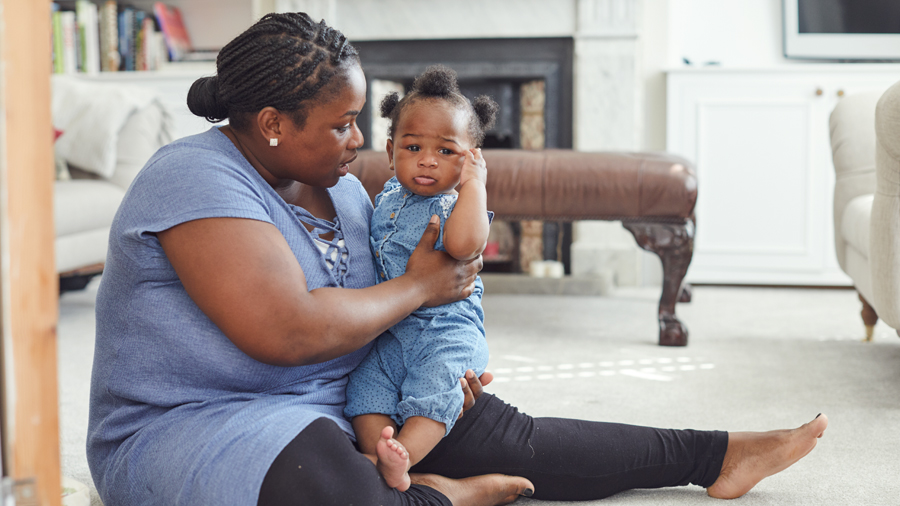 The perinatal period is that crucial time – during pregnancy and after birth - when parents are finding their feet and building bonds with their baby.
The perinatal period is that crucial time – during pregnancy and after birth - when parents are finding their feet and building bonds with their baby.
But this can also be a difficult time. Mums can experience perinatal mental health problems from antenatal and postnatal depression to anxiety and postpartum psychosis. Dads can also suffer mental health problems during this time, like depression and anxiety.
It can be difficult to look after yourself when you’re struggling – let alone a baby. That's why we've been campaigning to ensure parents get the support they need, wherever they live.
What Fight for a Fair Start has achieved
Since launching the campaign in 2019, there were a number of positive steps taken in each of the UK nations to improve the provision of perinatal and infant mental health support.:
- in Northern Ireland, we saw new specialist community services being developed
- in Wales, the first interim mother and baby unit was established
- in Scotland, the government announced £52 million for improving access to perinatal and infant mental health services
- in England, the government published a ‘Best Start for Life’ vision which included £100 million for perinatal and infant mental health services.
Get support if you or someone you know is struggling
We're here to support you, no matter your worry. Call us on 0808 800 5000, email [email protected] or fill in our online form
Some of our services are specially developed to help parents during pregnancy and after birth. Find out more about our working with families services, including how to get in touch with ones in your area.
 This campaign has been developed as part of our partnership with Jo Malone London which is focused on supporting parents with their mental health to help develop secure and healthy relationships with their children.
This campaign has been developed as part of our partnership with Jo Malone London which is focused on supporting parents with their mental health to help develop secure and healthy relationships with their children.
*DISCLAIMER
The quotes featured on this page are from real parents and practioners, but photographs have been posed by models.
References
-
1. Bauer, A, et al (2016) The costs of perinatal mental health problems (PDF). London: Centre for Mental Health. NHS England (2018) Partners of new mums with mental illness set to get targeted support on the NHS.
-
4. “The Belfast Health and Social Care Trust is the only trust which provides a specialist service.” Cunningham, C. et al (2018) Time for action on perinatal mental health care in Northern Ireland: a report on the perspectives of health visitors and midwives. NSPCC Northern Ireland: Belfast.
-
5. PMHN Needs Assessment 2019
-
6. Infant Foundation (2021) There are currently 39 parent-infant teams in the UK. https://parentinfantfoundation.org.uk/teams/locations/


